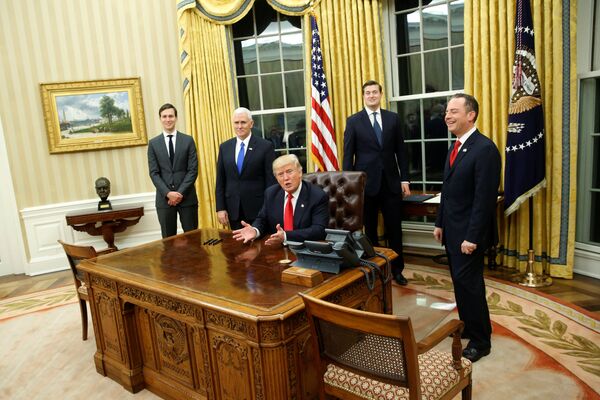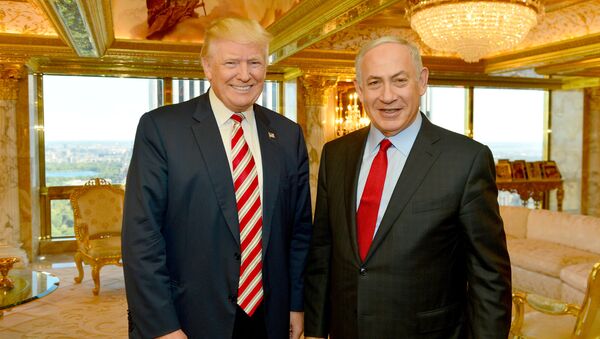Within hours of the US President's inauguration speech on January 20, he had appointed his son-in-law Jared Kushner as the envoy to the Middle-East peace process. Trump had already expressed his desire to move the US embassy in Israel from Tel Aviv to Jerusalem.

The Palestinian leader Mahmoud Abbas has suggested that the construction of a new embassy would "not help peace" and would "destroy the two-state solution." It would also be at odds with the United Nations' continued refusal to recognize Jerusalem as Israel's capital.

Seth Frantzman, a columnist for the Jerusalem Post has said that Trump's desire to move the embassy could be a sign of how he positions himself when it comes to the Israeli-Palestinian conflict.
"I don't think Trump has articulated his position clearly, but in a sense he has by seeking to appoint an ambassador, David Friedman, who is quite right-wing and said the settlements are not settlements […] That signals that Trump's view on East Jerusalem would be different from what the traditional American viewpoint of the State Department has been on Israel's rights to the West Bank and Jerusalem," Mr. Frantzman told Sputnik.
The appointment of Trump's son-in law may also be a clue into the new US president views the Israel-Palestinian situation, according to Mr. Frantzman.

Trump just said about Jared Kushner "If he can't produce peace in the Middle East, no one can."
— Yashar (@yashar) January 20, 2017
Mr. Frantzman also said that despite Trump wanting to move the embassy and his recent appointments, he will get bored after two years and his ultimate aim, like a lot of former US presidents, is to achieve a peace deal between the two sides.
"I think a lot of Israelis celebrated when George W. Bush came into office, but I think what Israel tends not to understand is that even if you have someone in the White House who is right-wing and supports Israel entirely, that sometimes those people also still want to come out of it with some sort of agreement or a peace deal. So, even though they appear right-wing they can still be more willing to put a lot of pressure on Israel, particularly because of the fact they're right-wing, just like Richard Nixon was able to come to some sort of deal with China " Mr. Frantzman said.
"It's not clear whether over the next four years that these voices will get everything they want. It could also be that because they feel Trump has been taken off the leash they may lead Israel into some sort of conflict like this embassy and going too far, so that could be another side of the coin" Mr. Frantzman added.
If Trump does move the embassy however, Mr. Fratzman believes it would be a "huge break" with a 70-80 year old tradition. He also said that previous US administrations have always come into office thinking that they can create change, but after a year or two they give up as the Middle East tends to remain the same and the Israeli-Palestinian conflict doesn't change.
The Middle East is like a puzzle, where all the pieces were made the wrong size and overlap on eachother and don't fit.
— Seth Frantzman (@sfrantzman) October 16, 2015
"There is a myth every four years — 'OK, now is the time that there will be peace' and sometimes — 'there'll be some sort of huge change,' but usually it's a circular thing and I would tend to be pessimistic and say that in general, there won't be peace, there wont be an agreement and probably, there wont be a radical change — outside of this embassy thing that could happen," Mr. Fratzman told Sputnik.
"I think Americans come into these things a bit naive and because of the nature of American politics, every four years you get a new administration, they always want to reinvent the wheel and the Americans tend to think, 'OK, we'll go in there and if we just give you X and you Y, well, why can't you by happy?'
"They're treating the situation like they're two kids playing in the sandbox and the reality of the Middle East and any country is that it's much more complex than that," Mr. Fratzman said.
Whether Trump's position on Israel and Palestine will affect that of the European Union remains to be seen, however Mr. Fratzman believes little will change and that the EU "will stay with its own line" partly because of its hostility to Trump. Yet, if the populist movement across Europe is to spread — following in the footsteps of Britain and Brexit for example — then a few countries could move away from "the consensus" and more towards the Israeli line.


